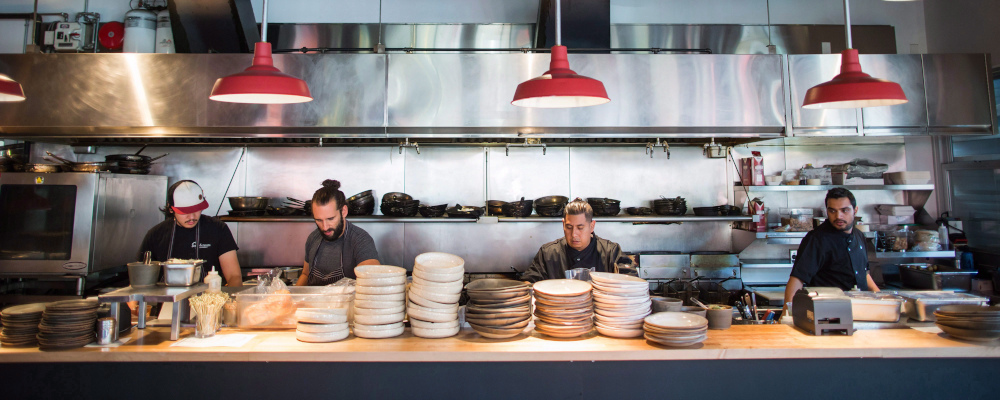
“[T]he city belongs among the things that exist by nature, and that man is by nature a political animal.” This quote comes from Aristotle’s Politics and tells us that he believed human beings were fundamentally social beings. Indeed, we have no more risk of becoming unsocial creatures than we do of stopping to eat. It’s in our nature. I’ve been reflecting on this point in the past few weeks as I’ve read The Hub‘s back-and-forth on the importance of work and the future of remote work.
You could disagree with Aristotle, but I would point in his favour the entirety of the restaurant industry as evidence of his claim. It’s possible that as a species we could have chosen to eat our meals alone, sans interaction, but throughout human history we have chosen to gather to eat and be together. The restaurant industry caters to this natural need and in so doing may tell us something about these renewed debates about how and where we work.
By way of background, I started in the restaurant industry at the Olive Garden at the intersection of Whitemud Drive and Calgary Trail while I was completing my undergraduate studies in Edmonton, Alberta. I worked as one of four dishwashers on shift in a damp and cramped corner of the kitchen that gave credence and a personal understanding to the term “dish pit.” I got the job to help finance my studies. Not only did the tips help give me a decent salary, but I also enjoyed the variety of people that I met. In kitchens, through dint of circumstance, the old works alongside the young, immigrants with locals, men together with women.This is in part because it is a grueling job that most people who have other options do not want and, to be perfectly honest, could not handle. Those who have other options, pursue those other options.
And even if you are someone like a chef, who is trying to make a career in the industry, you don’t tend to stay at one restaurant for too long but rather move around in search of better and higher-skilled employment. It is an industry in constant flux; people coming in and coming out. An industry where you’re constantly saying hi to new friends and saying goodbye to the ones you just recently made.
While working on my graduate degree in Montreal I returned to the familiar well (hell?) of the dish pit, finding myself, between my classes and my studies, at Reservoir, a local gastropub/micro-brewery. In September 2019 I graduated. In March 2020 the pandemic hit. Having just recently finished my last teaching assistant contract, I had not yet found post-graduate career work when everything shut down. I lost my job as a dishwasher, the only employment I had at the time.
Returning to the restaurant post-pandemic, I transitioned out of the dish pit and onto the cooking line. The employment landscape in the industry was different. Over two-thirds of Reservoir employees did not return to work following the pandemic including both the head chef and the sous-chef of the kitchen. Many of my pre-pandemic co-workers didn’t return to the restaurant because, among other reasons, they had been forced to find other means of employment over the two-plus years that saw the Québec government impose serious restrictions on civilian life in response to the pandemic. It went so far as to enforce an 8 PM curfew for many months, devastating the livelihoods of us in the service industry. Restaurants were mostly closed during that time and those that remained open did so with only a bare minimum of staff.At Reservoir, the sous-chef and the owners were the ones taking and making delivery orders. To this day, owners have been having difficulty hiring all the staff that they need to run their restaurants all throughout the province.
Now, nearly every restaurant in Montréal has a sign on its front window: “On embauche: plongeur(e), cuisinier(e) et serveur(se).” To lure employees back, owners have had to raise wages and offer things that had never been offered before (like benefits). Indeed, a little bit of power has trickled back into the working man’s corner and I for one will not bemoan a cook making $22/hr. The pandemic showed many that there is a better life out there beyond the service industry. And if you choose to be in the industry still, the market is in your favour and you are now better compensated for your work. All my friends who I used to work with at Reservoir are now either in school, doing work from home, or pursuing a career in a different field. This isn’t unique to my experience. Many former restaurant workers have found work from home in other industries. They make more, work less and less hard, and maintain a better, some may say even healthier, lifestyle.
All this to say, this is the market (finally, again) at work. And if allowed, it will work elsewhere too. The Hub’s series on the so-called Empty Office has expressed considerable concern about what remote work will mean for our economy. Perhaps a more dispersed, digitally mediated workforce really is a drag on productivity overall. Perhaps we truly need in-person, centralized workspaces to meet and mingle and produce the best ideas (though, rather famously, ideas are not bound by physical limitations). If so, then the firms that prioritize the physical return to work will eventually outcompete those that do not. Why fret over what the market will sort out itself?This of course applies only to the private sector—concerns about government-funded public service productivity are a separate discussion.
There is also a broader point to be made about just whose experiences consume our attention. It is worth remembering that economist Livio Di Matteo pointed out in these pages that at the peak of the pandemic in May 2020, only about 37 percent of Canadian workers were working from home. The experiences of a vast majority of us are being left out of this debate. Focusing on the particular circumstances of office workers necessarily means ignoring the plights of others who never left the workplace.
Whether they were ultimately rightheaded or wrongheaded, most often the policy responses of the COVID era prioritized the preferences of the same “laptop class” that now frets over the disruptions that have rippled out into wider waves across the workforce. It is not, for instance, a coincidence that the chattering classes driving our shutdown and now the return-to-work timetable were not, by and large, the ones to bear the brunt of the pandemic’s worst effects. A 2021 University of California (San Francisco) study found that the top-five occupations in the state with the highest 2020 mortality rate increases—a staggering more than 50 percent—were cooks, line workers in warehouses, agricultural workers, bakers, and construction labourers. Then and now, the state of sweltering and swear-filled kitchens bustling with the down and out of Paris (Ontario) and London (Ontario) deserve some elite-level consideration, too.
As for the workplace being the last secular bastion of social gathering, I do not worry about that. People are still coming out to restaurants as they were pre-pandemic. I know, I just cooked for ‘em all summer. People are still seeking out human interaction and meeting up together, for business and for pleasure. They are still working, just in different ways than before. Perhaps that crucial face-to-face meeting now happens over beers in a restaurant like Resevoir rather than a boardroom table in some bland office tower. Perhaps a desiccated office culture could lead to a renewed, you know, actual culture and revived local neighbourhoods.
None of this is to say that these empty office trends are not important to debate and study, but rather that the slow return to the physical workplace for the few sectors affected is not necessarily indicative of laziness or an unwillingness to work, nor does it signal—yet—any breakdown in economic productivity or societal cohesion. It’s too soon to tell. In the meantime, the rest of us are carrying on, same as we always have. For, as someone once wrote on the bathroom wall of Reservoir: “dishwashing may be temporary, but dishes are forever.”
Recommended for You

Ginny Roth: J.D. Vance, Pierre Poilievre, and how they slice their economic pie

Trevor Tombe: Canadians are paying billions in hidden taxes on new homes

Adam Zivo: No Dr. Bonnie Henry, drug prohibition is not ‘white supremacy’

Stephen Staley: Widespread deregulation is Canada’s golden ticket for economic growth









